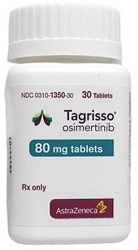AstraZeneca announced that it has received marketing authorisation from China’s National Medical Products Administration (NMPA) for Tagrisso (osimertinib) as a 1st-line treatment for adults with locally-advanced or metastatic non-small cell lung cancer (NSCLC) whose tumours have the genetic mutations of epidermal growth factor receptor (EGFR) exon 19 deletions or exon 21 (L858R) substitutions.
The approval followed the Priority Review Pathway and is based on results from the Phase III FLAURA trial, which were published in The New England Journal of Medicine.
Dave Fredrickson, Executive Vice President, Oncology, said: “The FLAURA trial has demonstrated the potential of Tagrisso as a new standard of care and as an important new 1st-line treatment option for non-small cell lung cancer patients in China, where approximately 30-40% are diagnosed with an EGFR mutation – more than any other country in the world.”
In the FLAURA trial, 1st-line use of Tagrisso provided a statistically-significant and clinically- meaningful improvement in progression-free survival (PFS), increasing the time patients lived without disease progression or death by a median of 18.9 months versus 10.2 months for those taking standard EGFR tyrosine kinase inhibitor (TKI) medicines (HR 0.46 [95% CI, 0.37-0.57], p<0.0001). This benefit was consistent across all patient subgroups including those with central nervous system (CNS) metastases.
 AstraZeneca recently announced that Tagrisso additionally showed a statistically-significant and clinically-meaningful improvement in overall survival in this patient population.
AstraZeneca recently announced that Tagrisso additionally showed a statistically-significant and clinically-meaningful improvement in overall survival in this patient population.
Safety data for Tagrisso in the FLAURA trial were in line with those observed in prior clinical trials. Tagrisso was generally well tolerated, with Grade 3 or higher adverse events (AEs) occurring in 34% of patients taking Tagrisso versus 45% in the comparator arm. The most common AEs in patients treated with Tagrisso were diarrhoea (58%), rash (58%), dry skin (36%), nail toxicity (35%), stomatitis (29%), fatigue (21%) and decreased appetite (20%).
Tagrisso was approved in China in March 2017 and added to the National Reimbursement Drug List (NRDL) effective from January 2019 for the 2nd-line treatment of adult patients with locally-advanced or metastatic EGFR T790M mutation-positive NSCLC, whose disease has progressed on or after EGFR-TKI therapy.
About Tagrisso
Tagrisso (osimertinib) is a third-generation, irreversible EGFR-TKI designed to inhibit both EGFR-sensitising and EGFR T790M-resistance mutations, with clinical activity against CNS metastases.
Tagrisso 40mg and 80mg once-daily oral tablets have now received approval in 75 countries, including the US, Japan, China and the EU, for 1st-line EGFRm advanced NSCLC, and in 84 countries, including the US, Japan, China and the EU, for 2nd-line use in patients with EGFR T790M mutation-positive advanced NSCLC. Tagrisso is also being developed in the adjuvant setting (ADAURA trial), in the locally-advanced unresectable setting (LAURA), in combination with chemotherapy in the advanced setting (FLAURA2), and with potential new medicines, including savolitinib in the Phase II trials SAVANNAH and ORCHARD.
About FLAURA
The FLAURA trial assessed the efficacy and safety of Tagrisso 80mg orally once daily vs. comparator EGFR-TKIs (either erlotinib [150mg orally, once daily] or gefitinib [250mg orally, once daily]) in previously-untreated patients with locally-advanced or metastatic EGFRm NSCLC. The trial was double-blinded and randomised, with 556 patients across 29 countries.
About AstraZeneca in lung cancer
AstraZeneca has a comprehensive portfolio of approved and potential new medicines in late-stage clinical development for the treatment of different forms of lung cancer spanning several stages of disease, lines of therapy and modes of action. We aim to address the unmet needs of patients with EGFRm tumours as a genetic driver of disease, which occur in 10-15% of NSCLC patients in the US and EU and 30-40% of NSCLC patients in Asia, with our approved medicines Iressa (gefitinib) and Tagrisso, and ongoing Phase III trials ADAURA, LAURA, FLAURA and FLAURA2 as well as the Phase II combination trials SAVANNAH and ORCHARD.3-5
Our extensive late-stage Immuno-Oncology programme focuses on lung cancer patients without a targetable genetic mutation which represents approximately three-quarters of all patients with lung cancer.8,9 Imfinzi (durvalumab), an anti-PDL1 antibody, is in development for patients with advanced disease (Phase III trials POSEIDON, PEARL, and CASPIAN) and for patients in earlier stages of disease including potentially-curative settings (Phase III trials AEGEAN, PACIFIC-2, ADRIATIC, ADJUVANT BR.31, PACIFIC-4, and PACIFIC-5) and both as monotherapy and in combination with tremelimumab and/or chemotherapy.
About AstraZeneca in oncology
AstraZeneca has a deep-rooted heritage in oncology and offers a quickly-growing portfolio of new medicines that has the potential to transform patients’ lives and the Company’s future. With at least six new medicines to be launched between 2014 and 2020, and a broad pipeline of small molecules and biologics in development, the Company is committed to advance oncology as a key growth driver for AstraZeneca focused on lung, ovarian, breast and blood cancers. In addition to AstraZeneca’s main capabilities, the Company is actively pursuing innovative partnerships and investment that accelerate the delivery of our strategy, as illustrated by the investment in Acerta Pharma in haematology.
By harnessing the power of four scientific platforms – Immuno-Oncology, Tumour Drivers and Resistance, DNA Damage Response and Antibody Drug Conjugates – and by championing the development of personalised combinations, AstraZeneca has the vision to redefine cancer treatment and, one day, eliminate cancer as a cause of death.
About AstraZeneca
AstraZeneca is a global, science-led biopharmaceutical company that focuses on the discovery, development and commercialisation of prescription medicines, primarily for the treatment of diseases in three therapy areas – Oncology, CVRM and Respiratory. AstraZeneca operates in over 100 countries and its innovative medicines are used by millions of patients worldwide.




















